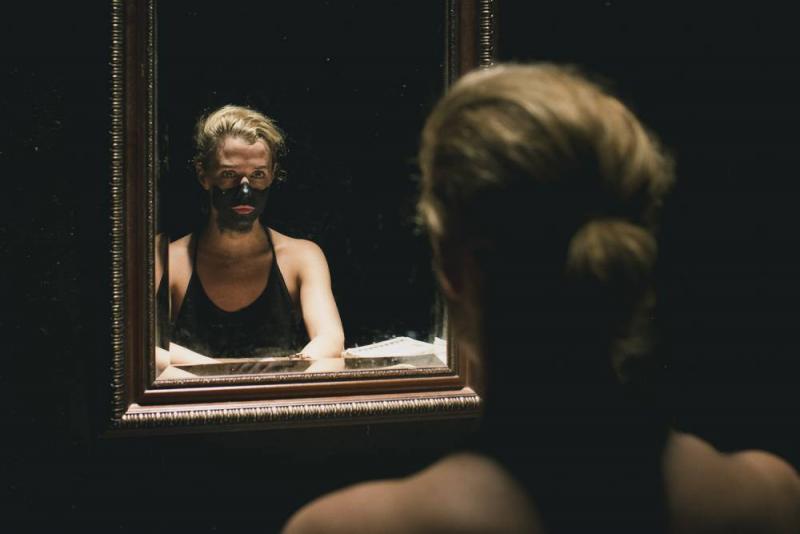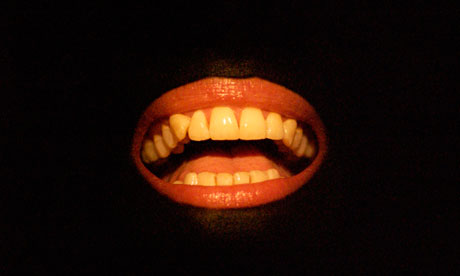Not I, Footfalls, Rockaby, Royal Court Theatre | reviews, news & interviews
Not I, Footfalls, Rockaby, Royal Court Theatre
Not I, Footfalls, Rockaby, Royal Court Theatre
Lisa Dwan dazzles in a richly dark interpretation of three Samuel Beckett short plays

In many ways, the darkness is the most memorable aspect of this production. It's so deep and all-encompassing that your eyes start to play tricks on you, seeing spots of light and shadow where there is only blackness. Because of this, when Lisa Dwan's mouth is slowly illuminated eight feet up on the stage, it's easy to dismiss it at first as just another trick of the dark.
 First performed at the Royal Court by Billie Whitelaw in 1973, Not I is a puzzling, maddening flow of words delivered at the "speed of thought" by a disembodied mouth (pictured right). Punctuated by the occasional groan or scream, Dwan flies through the text as if it were music, accenting certain words to form the melody and allowing the rest to merge as harmony. At the end of every section, she declaims the words, "what?… who?… no!… she!…", with a chilling change of pace, before plunging back into the fray. The concept is fascinating – Beckett attempted to create the purest possible form of drama, with his words delivered straight to the audience's ears without action or distraction. Even the title denies any personal input from the performer, who is known in the text merely as "mouth". Fittingly, the final effect is more than a little discomforting to experience, and extremely uncomfortable for the actor to perform, requiring thick tar-like face make-up and straps to hold the head and body rigid above the stage.
First performed at the Royal Court by Billie Whitelaw in 1973, Not I is a puzzling, maddening flow of words delivered at the "speed of thought" by a disembodied mouth (pictured right). Punctuated by the occasional groan or scream, Dwan flies through the text as if it were music, accenting certain words to form the melody and allowing the rest to merge as harmony. At the end of every section, she declaims the words, "what?… who?… no!… she!…", with a chilling change of pace, before plunging back into the fray. The concept is fascinating – Beckett attempted to create the purest possible form of drama, with his words delivered straight to the audience's ears without action or distraction. Even the title denies any personal input from the performer, who is known in the text merely as "mouth". Fittingly, the final effect is more than a little discomforting to experience, and extremely uncomfortable for the actor to perform, requiring thick tar-like face make-up and straps to hold the head and body rigid above the stage.
Compared to the previous two plays, 'Rockaby' is almost soothing
In this trio of later short works by Beckett, the austere brutality of Not I is followed by the ghostly light of Footfalls, in which Dwan plays a daughter pacing along a strip of floor outside her dying mother's room. She speaks of her mother, and her mother replies as a voice-over, throaty with age. At the outset, the daughter's words are familiar to anyone who has cared for an older person – bed pans, sponge baths, injections. But soon everything is vague and reclusive, and we are left wondering whether the daughter is dead, too. Aside from the text, Dwan's movement in this piece is superb. Beckett was extremely specific in the script exactly how the footfalls of the title should be executed, and she manages to make them percussive and rhythmical without seeming forced. The lighting, too, is spectacular – designer James Farncombe has done an outstanding job of hinting at the otherworldly uncertainties of the text in the grey shafts that illuminate Dwan's progress across the stage.
The final piece in this production is Rockaby. Dwan, now attired in a black Victorian-style evening gown, sits in an oversized rocking-chair which mysteriously rocks of its own accord, and delivers a mesmeric, circular monologue about the end of a life. As she delivers the last line, Dwan's head droops to one side – the end has come. Compared to the previous two plays, Rockaby is almost soothing, although Dwan's performance is no less compelling. Dominated by the darkness, this is an unsettlingly memorable and brilliantly executed hour of theatre.
rating
Explore topics
Share this article
The future of Arts Journalism
You can stop theartsdesk.com closing!
We urgently need financing to survive. Our fundraising drive has thus far raised £33,000 but we need to reach £100,000 or we will be forced to close. Please contribute here: https://gofund.me/c3f6033d
And if you can forward this information to anyone who might assist, we’d be grateful.

Subscribe to theartsdesk.com
Thank you for continuing to read our work on theartsdesk.com. For unlimited access to every article in its entirety, including our archive of more than 15,000 pieces, we're asking for £5 per month or £40 per year. We feel it's a very good deal, and hope you do too.
To take a subscription now simply click here.
And if you're looking for that extra gift for a friend or family member, why not treat them to a theartsdesk.com gift subscription?
more Theatre
 Ghosts, Lyric Hammersmith Theatre - turns out, they do fuck you up
Ten years on, Gary Owen and Rachel O'Riordan top their triumphant Iphigenia in Splott
Ghosts, Lyric Hammersmith Theatre - turns out, they do fuck you up
Ten years on, Gary Owen and Rachel O'Riordan top their triumphant Iphigenia in Splott
 All the Happy Things, Soho Theatre review - deep feelings, but little drama
New play about a sibling’s death is well imagined and deeply felt, but a bit slender
All the Happy Things, Soho Theatre review - deep feelings, but little drama
New play about a sibling’s death is well imagined and deeply felt, but a bit slender
 Shanghai Dolls, Kiln Theatre review - fascinating slice of history inadequately told
Amy Ng's take on two Chinese titans needs more dramatic ballast
Shanghai Dolls, Kiln Theatre review - fascinating slice of history inadequately told
Amy Ng's take on two Chinese titans needs more dramatic ballast
 Manhunt, Royal Court review - terrifyingly toxic masculinity
After his Olivier Award win for Oedipus, Robert Icke turns to a modern “monster”
Manhunt, Royal Court review - terrifyingly toxic masculinity
After his Olivier Award win for Oedipus, Robert Icke turns to a modern “monster”
 Midnight Cowboy, Southwark Playhouse - new musical cannot escape the movie's long shadow
Two misfits misfire in misconceived show
Midnight Cowboy, Southwark Playhouse - new musical cannot escape the movie's long shadow
Two misfits misfire in misconceived show
 Thanks for Having Me, Riverside Studios review - snappily performed comedy with a lightweight core
Writer-actor Keelan Kember floods the stage with a torrent of gags but few ideas
Thanks for Having Me, Riverside Studios review - snappily performed comedy with a lightweight core
Writer-actor Keelan Kember floods the stage with a torrent of gags but few ideas
 Rhinoceros, Almeida Theatre review - joyously absurd and absurdly joyful
Ionesco classic gets an entertainingly vivid and contemporary update
Rhinoceros, Almeida Theatre review - joyously absurd and absurdly joyful
Ionesco classic gets an entertainingly vivid and contemporary update
 The Importance of Being Oscar, Jermyn Street Theatre review - Wilde, still burning bright
Alastair Whatley honours his subject in a quietly powerful performance
The Importance of Being Oscar, Jermyn Street Theatre review - Wilde, still burning bright
Alastair Whatley honours his subject in a quietly powerful performance
 Stiletto, Charing Cross Theatre review - new musical excess
Quirky, operatic show won't please everyone, but will delight many
Stiletto, Charing Cross Theatre review - new musical excess
Quirky, operatic show won't please everyone, but will delight many
 Alfred Hitchcock Presents: The Musical, Theatre Royal Bath review - not a screaming success
1950s America feels a lot like 2020s America in this portmanteau show
Alfred Hitchcock Presents: The Musical, Theatre Royal Bath review - not a screaming success
1950s America feels a lot like 2020s America in this portmanteau show
 Wilko: Love and Death and Rock'n'Roll, Southwark Playhouse review - charismatic reincarnation of a rock legend
Johnson Willis captures the anarchic energy and wit of the late guitarist
Wilko: Love and Death and Rock'n'Roll, Southwark Playhouse review - charismatic reincarnation of a rock legend
Johnson Willis captures the anarchic energy and wit of the late guitarist

Add comment